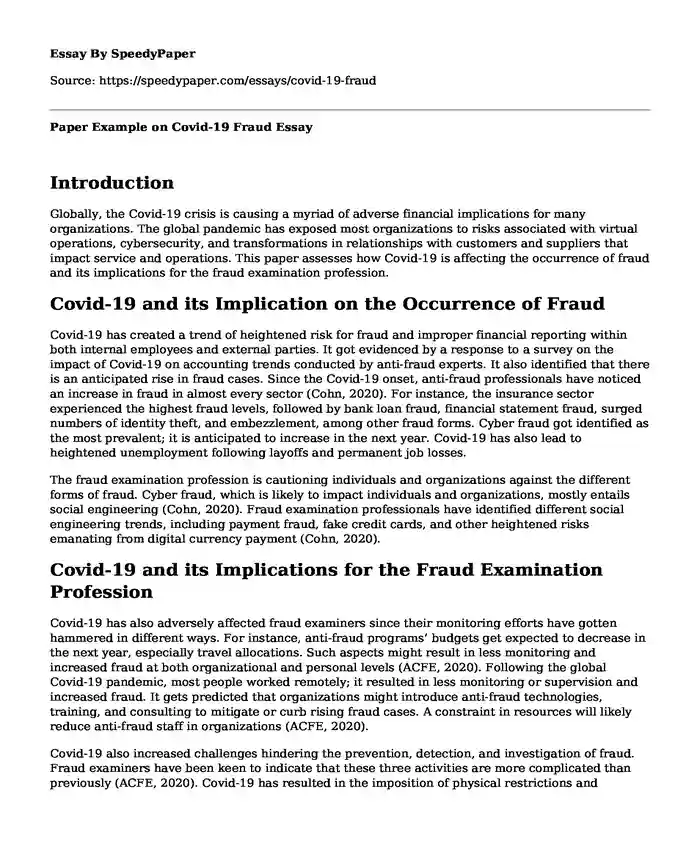Introduction
Globally, the Covid-19 crisis is causing a myriad of adverse financial implications for many organizations. The global pandemic has exposed most organizations to risks associated with virtual operations, cybersecurity, and transformations in relationships with customers and suppliers that impact service and operations. This paper assesses how Covid-19 is affecting the occurrence of fraud and its implications for the fraud examination profession.
Covid-19 and its Implication on the Occurrence of Fraud
Covid-19 has created a trend of heightened risk for fraud and improper financial reporting within both internal employees and external parties. It got evidenced by a response to a survey on the impact of Covid-19 on accounting trends conducted by anti-fraud experts. It also identified that there is an anticipated rise in fraud cases. Since the Covid-19 onset, anti-fraud professionals have noticed an increase in fraud in almost every sector (Cohn, 2020). For instance, the insurance sector experienced the highest fraud levels, followed by bank loan fraud, financial statement fraud, surged numbers of identity theft, and embezzlement, among other fraud forms. Cyber fraud got identified as the most prevalent; it is anticipated to increase in the next year. Covid-19 has also lead to heightened unemployment following layoffs and permanent job losses.
The fraud examination profession is cautioning individuals and organizations against the different forms of fraud. Cyber fraud, which is likely to impact individuals and organizations, mostly entails social engineering (Cohn, 2020). Fraud examination professionals have identified different social engineering trends, including payment fraud, fake credit cards, and other heightened risks emanating from digital currency payment (Cohn, 2020).
Covid-19 and its Implications for the Fraud Examination Profession
Covid-19 has also adversely affected fraud examiners since their monitoring efforts have gotten hammered in different ways. For instance, anti-fraud programs’ budgets get expected to decrease in the next year, especially travel allocations. Such aspects might result in less monitoring and increased fraud at both organizational and personal levels (ACFE, 2020). Following the global Covid-19 pandemic, most people worked remotely; it resulted in less monitoring or supervision and increased fraud. It gets predicted that organizations might introduce anti-fraud technologies, training, and consulting to mitigate or curb rising fraud cases. A constraint in resources will likely reduce anti-fraud staff in organizations (ACFE, 2020).
Covid-19 also increased challenges hindering the prevention, detection, and investigation of fraud. Fraud examiners have been keen to indicate that these three activities are more complicated than previously (ACFE, 2020). Covid-19 has resulted in the imposition of physical restrictions and lockdowns in various locations. Therefore most anti-fraud officials currently face an inability to travel; they cannot conduct remote interviews since it hinders easy access to evidence. Accountants can get used as a measure to safeguard against fraud. Bookkeepers can protect against bookkeeping swindles and inspire decent cultures at the organizational level. Accountants hold an obligation to shield the community, putting the people's interest beyond their interests and contributing to realizing an affirmative and principled philosophy within their business (Cohn, 2020).
Conclusion
In conclusion, the global Covid-19 pandemic has adversely affected most organizations, including the fraud examination profession. It has increased fraud, especially cyber fraud, through social engineering. Covid-19 has also hindered anti-fraud experts from effectively performing their duties due to movement restrictions and lockdowns in various geographical locations.
References
ACFE (2020, September 1). Fraud in the wake of COVID-19: Benchmarking Report, September 2020 Edition.
Cohn, M. (2020, September 14). Accounting Today: Fraud on the rise during coronavirus pandemic. https://www.accountingtoday.com/news/fraud-on-the-rise-during-coronavirus-pandemic.
Cite this page
Paper Example on Covid-19 Fraud. (2023, Dec 27). Retrieved from https://speedypaper.net/essays/covid-19-fraud
Request Removal
If you are the original author of this essay and no longer wish to have it published on the SpeedyPaper website, please click below to request its removal:
- Dentistry Essay Sample: Epidemiology and Etiology of Tooth Extraction
- Why Is Abortion Not Good? Check the Answer in Our Free Essay
- Free Essay Sample: Education for Health Delivery Systems
- Free Essay. a Successful Drug Abuse Recovery Program
- Free Essay: A Summary of a Group Work on Applying Stages of Change to Complex Behaviors
- Essay Sample on Historical Overview of the Affordable Care Act
- Mental health, Psychiatric Illness, Prevalence rate, Age, Violence, Incidences, Resources - Report Example
Popular categories





